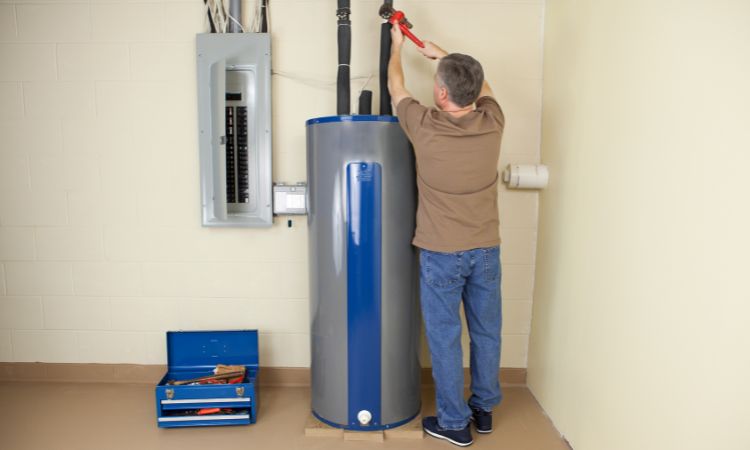Managing Common Water Heater Problems
Managing Common Water Heater Problems
Blog Article
How do you really feel in regards to Common Problems with Tank Water Heaters?

Envision beginning your day without your regular hot shower. That already sets a bad tone for the remainder of your day.
Every house requires a reputable hot water heater, but just a couple of know just how to handle one. One easy method to maintain your water heater in leading shape is to look for mistakes on a regular basis as well as fix them as quickly as they appear.
Keep in mind to turn off your hot water heater prior to sniffing about for faults. These are the water heater faults you are more than likely to encounter.
Water also hot or also cool
Every water heater has a thermostat that establishes how hot the water gets. If the water entering your home is as well hot in spite of setting a hassle-free optimum temperature level, your thermostat may be defective.
On the other hand, too cold water may be because of a failed thermostat, a damaged circuit, or improper gas circulation. For instance, if you utilize a gas water heater with a broken pilot burner, you would get cold water, even if the thermostat remains in ideal problem. For electric heating systems, a blown fuse may be the perpetrator.
Insufficient warm water
Hot water heater come in several sizes, depending upon your warm water demands. If you run out of warm water before everybody has actually had a bathroom, your water heater is as well small for your family size. You ought to consider setting up a bigger hot water heater tank or opting for a tankless water heater, which occupies less room as well as is much more resilient.
Odd noises
There go to least five sort of sounds you can hear from a hot water heater, but the most usual interpretation is that it's time for the hot water heater to retire.
First of all, you need to know with the typical seems a water heater makes. An electric heating system may seem different from a gas-powered one.
Popping or banging sounds typically mean there is a piece of sediment in your storage tanks, and it's time to clean it out. On the other hand, whistling or hissing noises may merely be your valves letting some stress off.
Water leakages
Leaks can come from pipes, water connections, valves, or in the worst-case circumstance, the storage tank itself. With time, water will certainly corrode the storage tank, and locate its escape. If this happens, you require to change your hot water heater immediately.
Nevertheless, before your change your entire storage tank, make certain that all pipelines remain in location which each shutoff works completely. If you still need assistance determining a leak, call your plumber.
Rust-colored water
Rust-colored water suggests among your hot water heater components is rusted. It could be the anode rod, or the tank itself. Your plumber will be able to determine which it is.
Lukewarm water
No matter just how high you established the thermostat, you will not get any kind of hot water out of a heater well past its prime. A hot water heater's performance may lower with time.
You will certainly likewise obtain warm water if your pipelines have a cross link. This indicates that when you switch on a faucet, hot water from the heater moves in alongside normal, cold water. A cross connection is very easy to place. If your hot water faucets still pursue closing the water heater valves, you have a cross connection.
Discoloured Water
Rust is a significant cause of filthy or discoloured water. Deterioration within the water tank or a falling short anode rod might cause this discolouration. The anode pole protects the storage tank from rusting on the inside and also must be inspected yearly. Without a pole or an appropriately working anode rod, the hot water swiftly wears away inside the container. Contact a professional hot water heater professional to establish if replacing the anode pole will repair the trouble; if not, change your water heater.
Conclusion
Preferably, your hot water heater can last 10 years prior to you require an adjustment. Nonetheless, after the 10-year mark, you might experience any of these mistakes much more routinely. At this moment, you must add a new water heater to your spending plan.
How To Troubleshoot 3 Common Water Heater Problems in Twin Cities
The Water Heater Is Leaking
A leaky cold water inlet valve A loose pipe fitting A leaky temperature and pressure relief valve A corroded anode rod A cracked tank Turn Off Your Water Heater:
Shut off your gas water heater by turning the gas valve on the unit to the “OFF” position. Shut off your electric water by switching its power off at your electrical panel. Look for a two-pole breaker labeled “water heater” and turn it to the “OFF” position. Move the ball valve connected to the water heater to be perpendicular to the piping at a 90° angle. Look for the Leak:
Depending on whether the water is coming from the tank's top or bottom, you’ll want to look for the leak in different locations.
If the leak comes from the top of the tank, carefully look for water escaping from the cold water inlet valve or loose pipe fittings. Rusted hot and cold water valves can have loose connections with the tank, with water leaking out of them.
https://mspplumbingheatingair.com/blog/how-to-troubleshoot-3-common-water-heater-problems
Hopefully you enjoyed our article on Common Problems with Your Home Water Heater. Thanks so much for spending some time to browse our blog. Are you aware of somebody else who is excited by the subject? Be sure promote it. Thank you so much for taking the time to read it.
Burst pipe? Phone! Report this page